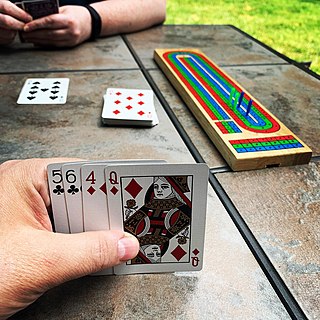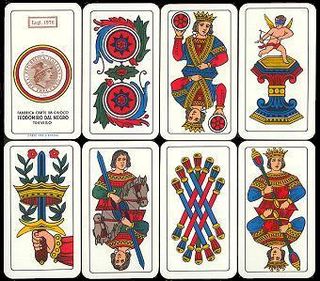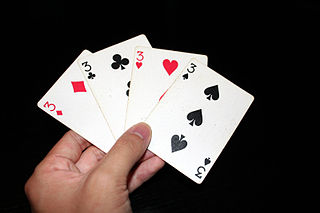
Sheepshead is an American trick-taking card game derived from Bavaria's national card game, Schafkopf, hence it is sometimes called American Schafkopf. Sheepshead is most commonly played by five players, but variants exist to allow for two to eight players. There are also many other variants to the game rules, and many slang terms used with the game.

Euchre or eucre is a trick-taking card game commonly played in Australia, Canada, Great Britain, New Zealand, and the Midwestern United States. It is played with a deck of 24, 28, or 32 standard playing cards. There are normally four players, two on each team, although there are variations for two to nine players.

Crazy Eights is a shedding-type card game for two to seven players and the best known American member of the Eights Group which also includes Pig and Spoons. The object of the game is to be the first player to discard all of their cards. The game is similar to Switch and Mau Mau.

Cribbage, or crib, is a card game, traditionally for two players, that involves playing and grouping cards in combinations which gain points. It can be adapted for three or four players.

Scopa is an Italian card game, and one of the three major national card games in Italy, the others being Briscola and Tresette. It is also popular in Argentina and Brazil, brought in by Italian immigrants, mostly in the Scopa a Quindici variation. Scopa is also played in former Italian colonies such as Libya and Somalia or some other countries like Tunisia and even Morocco with changed appearance in the cards. It is played with a standard Italian 40-card deck, mostly between two players or four in two partnerships, but it can also be played by three or six players.

Cassino, sometimes spelt Casino, is an English card game for two to four players using a standard, 52-card, French-suited pack. It is the only fishing game to have penetrated the English-speaking world. It is similar to the later Italian game of Scopa and is often said, without substantiation, to be of Italian origin. Cassino is still played today in Madeira, probably due to English influence.

Truco, a variant of Truc, is a trick-taking card game originally from Valencia and the Balearic Islands, popular in South America and Italy. It is usually played using a Spanish deck. Two people may play, or two teams of two or three players each.

Sheng ji is a family of point-based, trick-taking card games played in China and in Chinese immigrant communities. They have a dynamic trump, i.e., which cards are trump changes every round. As these games are played over a wide area with no standardization, rules vary widely from region to region.
Sueca is a 4 player-partnership point trick-taking card game of the ace–ten family, and a popular variant of the Bisca card game. The game is played in Portugal, Brazil, Angola and other Portuguese communities. Its closest relative is the very similar German game Einwerfen.

Conquian, Coon Can or Colonel is a rummy-style card game. David Parlett describes it as an ancestor to all modern rummy games, and a kind of proto-gin rummy. Before the appearance of gin rummy, it was described as "an excellent game for two players, quite different from any other in its principles and requiring very close attention and a good memory to play it well".

Tute is a trick-taking card game of the ace–ten family for two to four players. Originating in Italy, where it was known as tutti, during the 19th century the game spread in Spain, becoming one of the most popular card games in the country. The name of the game was later modified by Spanish speakers, who started calling the game tute. The game is played with a deck of traditional Spanish playing cards, or naipes, that is very similar to the Italian 40-card deck.

Euchre is a 19th-century trick-taking card game and has many variations.
Go-Stop, also called Godori is a Korean fishing card game played with a Hwatu (Korean: 화투) deck. The game can be called Matgo (Korean: 맞고) when only two players are playing.

Monte Bank, Mountebank, Spanish Monte and Mexican Monte, sometimes just Monte, is a Spanish gambling card game and was known in the 19th century as the national card game of Mexico. It ultimately derives from basset, where the banker (dealer) pays on matching cards. The term "monte" has also been used for a variety of other gambling games, especially varieties of three-card poker, and for the swindle three-card monte.

Kemps is a matching card game for two to six teams of two players each, where each player must secretly communicate to their partner when they have four matching cards in their hand. The game is a "cross between Commerce and Authors" with the unusual feature of partnership play. This "party classic" is also known as Canes, Cash and Kent. It appears to be a 21st century game played in America, France and Switzerland (known there as Gemsch or Gämsch, but its origin is unclear.
Bisca is a card game based on the Italian deck.

Zwickern or Zwicker, is a German fishing card game for two to eight players played in Schleswig-Holstein in North Germany. It is an old game whose rules first appeared in 1930. It has been described as "a simpler and jollier version of Cassino", which is "exciting and entertaining" and easy to learn. German author, Hans Fallada, who learned it in while in gaol at Neumünster, called it "a rather cunning farmer's game from Holstein." The feature that makes it unique among fishing games is its use of up to 6 Jokers.

Skwitz was a 19th-century Austrian card game of the fishing type for 2 to 8 players that was said to be of English origin. It may be a descendant of Cassino which it resembles.

Papillon is an old French card game of the fishing type for three or four players. It has been described as "perfect for children who know how to count".

Escopa is the Brazilian variant of the Italian national card game of Scopa that was brought to Brazil by Italian immigrants. Escopa has elements of Spanish Escoba and of the Portuguese Escova. All these games are related to the variant of Italian Scopa called Scopa di Quindici
















